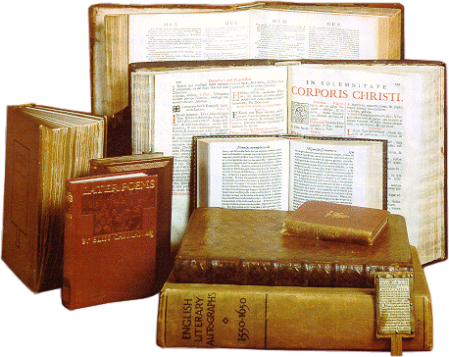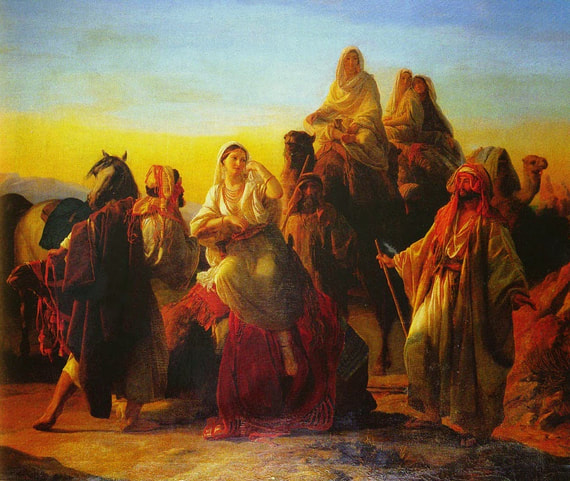Romans 9:1-18
Lesson 300
Read both the "King James Bible" and the "New Living Translation."
In this lesson:
God's choice.
Paul's sorrow for unbelieving Jews (9:2-5).
The real Jew is not the person descended from Abraham.
The children of God are those who've accepted the divine promise (9:6-12).
Beginning with this lesson and running through verse 11:36 (lesson 306);
God's sovereignty in saving Jew and Gentile.
God's choice.
Paul's sorrow for unbelieving Jews (9:2-5).
The real Jew is not the person descended from Abraham.
The children of God are those who've accepted the divine promise (9:6-12).
Beginning with this lesson and running through verse 11:36 (lesson 306);
God's sovereignty in saving Jew and Gentile.
Rebecca meets Abraham's servant.
By German artist Friedrich August Bouterwek (1806-1867).
By German artist Friedrich August Bouterwek (1806-1867).
Who was -
Rebecca-
Rebecca is the Greek name for Rebekah. Rebekah was the daughter of Bethuel (Genesis 24:15; 24:24), Abraham's nephew (Genesis 22:23). A woman of great beauty (Genesis 24:16; 26:7), Rebekah was discovered by Abraham's servant, who was sent to the city of Nahor to find a wife for Abraham's son Isaac. She agreed to leave her home with the servant (Genesis 24:58-61) to meet Isaac and become his wife (Genesis 24:67). After nineteen years of marriage, Rebekah gave birth to twin sons, Esau and Jacob (Genesis 25:24-26). Jacob's name was eventually changed to Israel, and he became the patriarch of the Israelites and a central figure in Judaism and Christianity. The details of Rebekah's death are unknown, but she was buried in a cave of Machpelah (Genesis 49:30-31).
Isaac -
Hebrew for "he laughs," Isaac was Abraham and Sarah's only son (Ishmael was Abraham's son out of Hagar) miraculously born when Abraham was one hundred years old (Genesis 21:5) and Sarah ninety (Genesis 17:17). When Isaac was a youngster, God tested Abraham's faith by telling him to sacrifice the boy. Abraham proved his unyielding devotion to God by preparing to offer Isaac up as a sacrifice when he was stopped by an "angel of the Lord" (Genesis 22:1-13; Hebrews 11:17; James 2:21). Abraham's willingness to follow God's command earned him God's promise to make his descendants (the Israelites) a great people. God repeated the promise to Isaac (Genesis 26:24) and eventually to Isaac's son, Jacob. Isaac trusted God and became an example of faith (Hebrews 11:20). Through him and Jacob, God fulfilled His promise to make the Israelites a great and populous people. Isaac died in Hebron at one hundred and eighty years old (Genesis 35:28). You can read more about him in Genesis 17:15-28:22.
Jacob -
Also called Israel. With his twin brother Esau, Jacob was the son of Isaac and Rebekah and Abraham's grandson. Jacob, Isaac, and Abraham are three of the Old Testament's most important figures. God chose Jacob over his brother Esau to fulfill His promise to Abraham to make Israel a great and populous nation (Genesis 48:1-22). With his mother Rebekah's help, Jacob conned his twin brother Esau out of his father's blessing and birthright (Genesis 25:27-34;
Genesis 27:1-45). The birthright included the land of Canaan promised to Jacob's father Isaac and grandfather Abraham. Esau vowed to kill Jacob for his trickery (Genesis 27:41), forcing Jacob to flee to his Uncle Laban in Haran. On his way to Haran, Jacob had a vision of climbing a ladder ("Jacob's ladder") to heaven. When he reached the top, God repeated His promise to Isaac and Abraham (Genesis 28:12-14). Jacob and Esau eventually reconciled, and Jacob became a shining example of faith. Even when dying, he never doubted God's promise to make Israel a great nation (Hebrews 11:21-22). Jacob died at the age of one hundred and forty-seven (Genesis 47:28). In time, Moses led Jacob's descendants out of slavery in Egypt. Forty years later, Joshua led them into the promised land, thus fulfilling God's promise. Jacob is the patriarch of the Israelites, and the twelve tribes of Israel are named after his sons. You can learn more about Jacob in Genesis 25:1-37:36.
Esau -
Esau was the son of Isaac and Rebekah and Jacob's older twin brother. As the most senior, Esau was Isaac's natural heir but traded his birthright to his younger brother Jacob for a bowl of pottage (Genesis 25:29-34). Against his parent's wishes, Esau married two Canaanite women (Genesis 26:34-35) and then tried to set things right by marrying his cousin Mahalath, the daughter of Ishmael (Genesis 28:8-9). Esau eventually aligned himself with the Ishmaelite tribes and became a powerful chief in the kingdom of Edom. While his twin brother Jacob became the patriarch of the Israelites, the Bible calls Esau the father of the Edomites (Genesis 36:43). You can read more about Esau in Genesis 25:1-36:43.
Rebecca-
Rebecca is the Greek name for Rebekah. Rebekah was the daughter of Bethuel (Genesis 24:15; 24:24), Abraham's nephew (Genesis 22:23). A woman of great beauty (Genesis 24:16; 26:7), Rebekah was discovered by Abraham's servant, who was sent to the city of Nahor to find a wife for Abraham's son Isaac. She agreed to leave her home with the servant (Genesis 24:58-61) to meet Isaac and become his wife (Genesis 24:67). After nineteen years of marriage, Rebekah gave birth to twin sons, Esau and Jacob (Genesis 25:24-26). Jacob's name was eventually changed to Israel, and he became the patriarch of the Israelites and a central figure in Judaism and Christianity. The details of Rebekah's death are unknown, but she was buried in a cave of Machpelah (Genesis 49:30-31).
Isaac -
Hebrew for "he laughs," Isaac was Abraham and Sarah's only son (Ishmael was Abraham's son out of Hagar) miraculously born when Abraham was one hundred years old (Genesis 21:5) and Sarah ninety (Genesis 17:17). When Isaac was a youngster, God tested Abraham's faith by telling him to sacrifice the boy. Abraham proved his unyielding devotion to God by preparing to offer Isaac up as a sacrifice when he was stopped by an "angel of the Lord" (Genesis 22:1-13; Hebrews 11:17; James 2:21). Abraham's willingness to follow God's command earned him God's promise to make his descendants (the Israelites) a great people. God repeated the promise to Isaac (Genesis 26:24) and eventually to Isaac's son, Jacob. Isaac trusted God and became an example of faith (Hebrews 11:20). Through him and Jacob, God fulfilled His promise to make the Israelites a great and populous people. Isaac died in Hebron at one hundred and eighty years old (Genesis 35:28). You can read more about him in Genesis 17:15-28:22.
Jacob -
Also called Israel. With his twin brother Esau, Jacob was the son of Isaac and Rebekah and Abraham's grandson. Jacob, Isaac, and Abraham are three of the Old Testament's most important figures. God chose Jacob over his brother Esau to fulfill His promise to Abraham to make Israel a great and populous nation (Genesis 48:1-22). With his mother Rebekah's help, Jacob conned his twin brother Esau out of his father's blessing and birthright (Genesis 25:27-34;
Genesis 27:1-45). The birthright included the land of Canaan promised to Jacob's father Isaac and grandfather Abraham. Esau vowed to kill Jacob for his trickery (Genesis 27:41), forcing Jacob to flee to his Uncle Laban in Haran. On his way to Haran, Jacob had a vision of climbing a ladder ("Jacob's ladder") to heaven. When he reached the top, God repeated His promise to Isaac and Abraham (Genesis 28:12-14). Jacob and Esau eventually reconciled, and Jacob became a shining example of faith. Even when dying, he never doubted God's promise to make Israel a great nation (Hebrews 11:21-22). Jacob died at the age of one hundred and forty-seven (Genesis 47:28). In time, Moses led Jacob's descendants out of slavery in Egypt. Forty years later, Joshua led them into the promised land, thus fulfilling God's promise. Jacob is the patriarch of the Israelites, and the twelve tribes of Israel are named after his sons. You can learn more about Jacob in Genesis 25:1-37:36.
Esau -
Esau was the son of Isaac and Rebekah and Jacob's older twin brother. As the most senior, Esau was Isaac's natural heir but traded his birthright to his younger brother Jacob for a bowl of pottage (Genesis 25:29-34). Against his parent's wishes, Esau married two Canaanite women (Genesis 26:34-35) and then tried to set things right by marrying his cousin Mahalath, the daughter of Ishmael (Genesis 28:8-9). Esau eventually aligned himself with the Ishmaelite tribes and became a powerful chief in the kingdom of Edom. While his twin brother Jacob became the patriarch of the Israelites, the Bible calls Esau the father of the Edomites (Genesis 36:43). You can read more about Esau in Genesis 25:1-36:43.
Study Tip:
Reviewing past lessons helps tie the Bible together in your mind.
Reviewing past lessons helps tie the Bible together in your mind.




